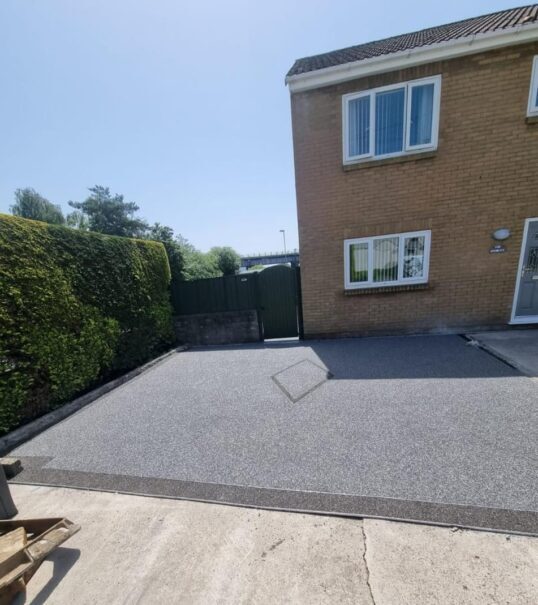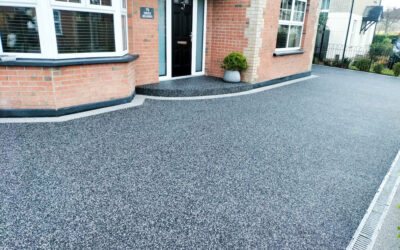Introduction
When it comes to choosing the right material for a new driveway, homeowners are often faced with a plethora of options, each offering different benefits and drawbacks. Among the most popular choices are resin driveways and traditional paving driveways, such as concrete, asphalt, and block paving. This blog will delve into the pros and cons of each type, helping you make an informed decision based on durability, cost, aesthetics, maintenance, and environmental impact.
Understanding Resin Driveways
Resin driveways consist of a mixture of aggregate stones and a resin binder that is laid over a solid base. This combination creates a smooth, durable, and permeable surface. There are two main types of resin driveways: resin-bound and resin-bonded, each offering a slightly different finish and set of characteristics.
Understanding Traditional Paving
Traditional paving includes a variety of materials such as concrete, asphalt, and block paving. These materials have been used for decades to create durable and functional driveways. Each material offers different aesthetics and has its own installation and maintenance requirements.
Pros and Cons of Resin Driveways
Pros:
Aesthetics: Resin driveways offer a smooth, attractive finish that can be customized with different colours and types of aggregate to match any home exterior
Permeability: Resin-bound driveways are permeable, allowing water to drain through to the ground beneath. This reduces runoff and makes them compliant with Sustainable Urban Drainage Systems (SUDS) regulations.
Durability and Maintenance: Resin surfaces are durable and resistant to weeds. They also don’t have joints, which prevents weeds from growing through and makes them easy to maintain.
UV Stability: High-quality resin is UV-stable, which means it won’t fade or discolour when exposed to sunlight.
Cons:
Cost: Resin driveways can be more expensive than traditional options, particularly if a suitable base needs to be laid first.
Installation Sensitivity: The installation of a resin driveway requires dry and warm conditions, and the process must be handled by experienced professionals to avoid poor finishes.
Repairs: While durable, repairs can be noticeable due to colour mismatches in the resin or aggregate.
Pros and Cons of Traditional Paving Driveways
Pros:
Strength and Durability: Materials like concrete and asphalt are incredibly strong and can handle a great deal of weight, which makes them suitable for heavy vehicles.
Cost-Effectiveness: Asphalt, in particular, is often less expensive than resin, making it a budget-friendly option.
Repairs: Repairs can be simpler and less noticeable, especially with asphalt, as new layers can be added over the old ones.
Cons:
Aesthetics: While functional, traditional paving materials generally offer less aesthetic flexibility compared to resin.
Permeability: Most traditional materials are non-permeable, leading to runoff issues that may require additional drainage solutions.
Maintenance: Concrete can crack and will require sealing, asphalt needs resealing and patching, and block paving can shift and allow weeds to grow through the joints.
Environmental Impact: Traditional non-permeable materials contribute to surface runoff, which can lead to pollution and erosion.
Making the Right Choice
When deciding between a resin and a traditional paving driveway, consider the following:
- Budget: Determine how much you are willing to spend. Remember that while upfront costs are important, so are long-term maintenance and durability.
- Aesthetics: Consider what style complements your home and whether you desire a customizable appearance.
- Usage: Think about the amount and type of traffic your driveway will endure.
- Climate: Certain materials perform better in specific climates; for example, resin works well in areas prone to flooding due to its permeability.
- Local Regulations: Check if there are any local regulations that might influence your choice, such as requirements for permeable surfaces.
Conclusion
Both resin and traditional paving driveways have their own set of advantages and disadvantages. Choosing the right material depends largely on individual needs, preferences, budget, and environmental considerations. While resin driveways offer modern technology and aesthetics with enhanced drainage capabilities, traditional paving remains a strong contender due to its proven durability and cost-effectiveness. Weighing these factors carefully will ensure that you select the best driveway material for your home, enhancing both its functionality and curb appeal.
For further information, click here visit our website or call Resin Driveways Wigan on 01942-559729.
Click here to complete our contact form and see how we can help you with your resin bound surfacing needs.



